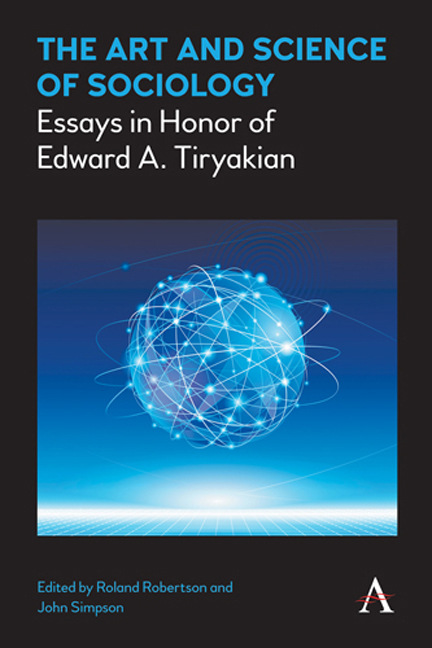Book contents
- Frontmatter
- Contents
- List of Figures and Tables
- List of Contributors
- Acknowledgments
- Introduction
- Chapter 1 The Dynamo and the Diplomat: Tiryakian's Role in Preserving Sorokin's Reputation
- Chapter 2 Edward Tiryakian and Modernization Theory: A Very Special Relationship
- Chapter 3 Developmental Path (Entwicklungsform): A Neglected Weberian Concept and Its Usefulness in the Civilizational Analysis of Islam
- Chapter 4 The Existential Sociology of Edward Tiryakian: Toward an Integrated Paradigm
- Chapter 5 Comparative Reflections on Sociology and Conservatism: The Contributions of Edward A. Tiryakian
- Chapter 6 Contemporary Changes in the Processes of Social Differentiation: Toward an Analytical Version of the Theory
- Chapter 7 Considerations on Global Studies
- Chapter 8 Honoring Edward Tiryakian as a Metasociologist: A Metaconceptual Analysis of Prosumption and Related Concepts
- Chapter 9 Dangerous Nouns of Process: Differentiation, Rationalization, Modernization
- Chapter 10 Modernization as Social Becoming: Ten Theses on Modernization
- Chapter 11 Religion and Evolution
- Chapter 12 The “Axial Age” vs. Weber's Comparative Sociology of the World Religions
- Edward A. Tiryakian's Publications
- Index
Chapter 12 - The “Axial Age” vs. Weber's Comparative Sociology of the World Religions
Published online by Cambridge University Press: 22 July 2017
- Frontmatter
- Contents
- List of Figures and Tables
- List of Contributors
- Acknowledgments
- Introduction
- Chapter 1 The Dynamo and the Diplomat: Tiryakian's Role in Preserving Sorokin's Reputation
- Chapter 2 Edward Tiryakian and Modernization Theory: A Very Special Relationship
- Chapter 3 Developmental Path (Entwicklungsform): A Neglected Weberian Concept and Its Usefulness in the Civilizational Analysis of Islam
- Chapter 4 The Existential Sociology of Edward Tiryakian: Toward an Integrated Paradigm
- Chapter 5 Comparative Reflections on Sociology and Conservatism: The Contributions of Edward A. Tiryakian
- Chapter 6 Contemporary Changes in the Processes of Social Differentiation: Toward an Analytical Version of the Theory
- Chapter 7 Considerations on Global Studies
- Chapter 8 Honoring Edward Tiryakian as a Metasociologist: A Metaconceptual Analysis of Prosumption and Related Concepts
- Chapter 9 Dangerous Nouns of Process: Differentiation, Rationalization, Modernization
- Chapter 10 Modernization as Social Becoming: Ten Theses on Modernization
- Chapter 11 Religion and Evolution
- Chapter 12 The “Axial Age” vs. Weber's Comparative Sociology of the World Religions
- Edward A. Tiryakian's Publications
- Index
Summary
This chapter explores the notion of the “Axial Age,” much-discussed of late, and compares it with Weber's comparative sociology of the world religions. In contrast to the coherence and similarity of developments implied in the Axial Age thesis, this chapter argues that Weber was more inclined to emphasize the differences between the various world religions and their divergent consequences for the worldviews of those socialized into them.
Recent developments in the field of economic history raise profound problems for what has long been known as “the Weber thesis” or “the Protestant ethic thesis”—the idea that it was Protestantism, and especially Calvinism, that (however inadvertently) provided the “spirit of capitalism.” Commencing with the work of Kenneth Pomeranz in his landmark 2000 book, The Great Divergence: China, Europe, and the Making of the Modern World Economy, the view has increasingly prevailed that, contrary to earlier accounts, Europe only surged ahead of the rest of the world economically around the beginning of the nineteenth century. This view has subsequently been endorsed, if on various grounds, by such authors as the ancient historian Ian Morris (2010) and the economist Angus Deaton (2013). For his part, Michael Mann (1986: 377) has argued that the crucial developments underlying European hegemony—in particular, the “normative pacification” provided by medieval Catholicism, lowering transaction costs among the inhabitants of the then-obscure West European peninsula—were in place centuries before the Protestant Reformation. Taken together, these analyses raise doubts about whether “the Protestant ethic thesis” can be seriously said to explain Europe's rise to dominance of the modern world, unless one is prepared to countenance the claim that it took two hundred years or more for the “Protestant ethic” to supply the necessary push toward the European economic takeoff.
Max Weber's comparative sociology of the world religions was based precisely on this notion, however. Weber's studies of the religions of China, India and ancient Palestine were oriented toward illuminating their “economic ethics”—in other words, the ways in which their doctrines were or were not conducive to giving birth to “modern rational capitalism,” as Weber characterized the new economic order.
- Type
- Chapter
- Information
- The Art and Science of SociologyEssays in Honor of Edward A. Tiryakian, pp. 189 - 204Publisher: Anthem PressPrint publication year: 2016

